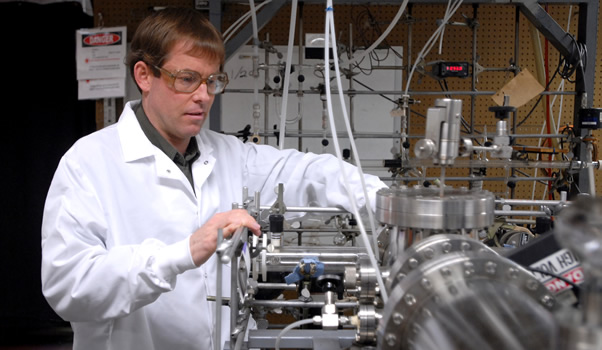Fact and Fiction
Chemistry Professor Scott Hewitt Presents Findings on Global Warming
February 17, 2009
The Earth is warming and the results will radically change our world, said Scott Hewitt, professor of chemistry and biochemistry.
Even as his parents shiver through a frigid Wisconsin winter, Hewitt remains firm in his effort to warn others that global warming is real and its potential to change not only the face of the world we live on but the way we may survive. Global warming, he stressed, refers to the global climate change, not a weather change. “Weather refers to one time and one place,” he reports, “whereas global climate is the average weather over the entire planet for many years.”
In the first of two presentations the scientist gave on Thursday, Feb. 5, during the National Teach-in on Global Warming, Hewitt explained the components and concerns of climate change.
Hewitt explained the greenhouse effect and how some is good — “without the greenhouse effect, the average temperature on Earth would be about -2 Fahrenheit” — but too much creates the danger of global warming.
Signs of global warming:
- Ten to 15 years of record warm temperatures relative to the last 130 years
- Record levels of carbon dioxide in the atmosphere since 1950 relative to the last 400,000 years
- Loss of arctic sea ice
- Disappearing snowcaps, such as the glacier on Mt. Kilimanjaro, and increase in sea levels
Predicted results of global warming:
- Flooding of coastal areas
- Change in regional weather
- Geographic shifts in flora and fauna with loss of biodiversity, agricultural productivity, disease and fishing
- Economic loss
We have already reached levels of carbon dioxide and greenhouse gas emissions that are too high, some scientists predict. It is up to all of us to reduce our greenhouse gas emissions, the scientist said, asking “Tomorrow, what will you do to build a more sustainable future?”
(Download Hewitt’s PowerPoint presentation “Global Warming: Fact, Fiction and Best Estimates,")
In his second presentation, Hewitt urged his audience to focus on a sustainable or green future for a healthy environment, community, business and population. Sustainability, he stressed, is about our choices both at work and at home.
Hewitt said U.S. companies are already realizing the value of “being green” in reduced costs by using fewer natural resources and enhancing revenues by selling “green” products. That means there are job opportunities available for those knowledgeable about sustainability, he said.
(Download Hewitt's second presentation “Green Jobs, Green Lives: What Each of Us Can Do to be More Sustainable and Increase Our Savings.” )
Related Story:
Scientist Leads Academic Senate
For questions about Hewitt’s presentations, contact the professor at shewitt@fullerton.edu.


